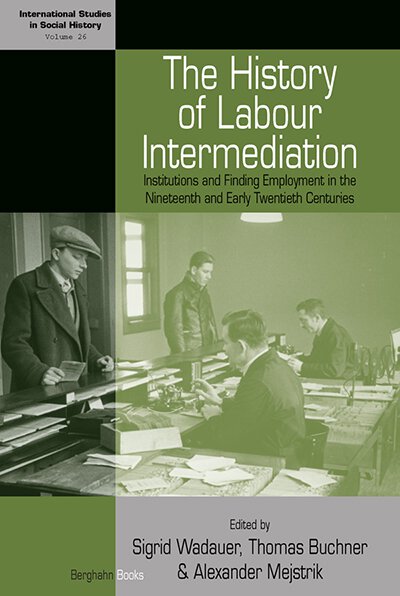
Series
Volume 26
International Studies in Social History
See Related
History JournalsEmail Newsletters
Sign up for our email newsletters to get customized updates on new Berghahn publications.
The History of Labour Intermediation
Institutions and Finding Employment in the Nineteenth and Early Twentieth Centuries
Edited by Sigrid Wadauer, Thomas Buchner, and Alexander Mejstrik
444 pages, 30 illus., 10 tables, bibliog., index
ISBN 978-1-78238-550-9 $150.00/£115.00 / Hb / Published (April 2015)
eISBN 978-1-78238-551-6 eBook
Reviews
“The editors should be applauded for going some way towards re-orienting historical research from the well-established focus on nascent systems of public labour intermediation to show the continuous persistence of older forms of labour recruitment and social classification as well as the precarious economic and bureaucratic conditions upon which public offices operated.” • H-Soz-Kult
“This collection has the great merit of having chosen an interesting and socio-politically topical theme which, up to now, has been paid little attention by historians… No doubt, it represents a first insightful step towards a phenomenon still to be researched more extensively.” • Sehepunkte
“[This book] offers a valuable overview of the histories of job mediation in Europe from the late 19th century onwards. It shows different trajectories that are predicated upon different types of state interference or abstinence from economic life, national trajectories of labour movements, and the trajectories of organisation of labour placement over time. For anyone who wants to get a proper understanding of the working of labour markets in modern Europe this work is a potential ‘must read.’” • Ulbe Bosma, International Institute of Social History
“…the book provides insight into job-search and job-placement institutions and practices….The entire enterprise is predicated on providing, for the very first time, a transnational view of job-placement issues, with a focus on the turn of the 19th century. Another point of interest is combining the study of institutions and individuals. This multi-level approach is quite an original and promising one…” • Bénédicte Zimmermann, EHESS
Description
Searching for a job has been an everyday affair in both modern and past societies, and employment a concern for both individuals and institutions. The case studies in this volume investigate job search and placement practices in European countries, Australia, and India in the nineteenth and twentieth centuries. The contributors explore how looking for work becomes a means by which participants (individuals, placement agents, trade unions, municipalities, administrations, state authorities, and schools) articulated specific interests, perspectives, and agendas. Taking an exploratory approach, the chapters illustrate different approaches to the history of employment and job searching, ranging from organizational and regulatory histories to the analysis of practices and autobiographical accounts. In the process, they uncover the interrelations of search practices and attempts to arrange placement services.
Sigrid Wadauer is currently Fellow at the International Research Center Work and Lifecycle in Global History at the Humboldt University Berlin. She is principal investigator of the START- and ERC Starting Grant-Project “The Production of Work” at the University in Vienna.
Thomas Buchner is a Postdoctoral researcher at the University of Vienna, ERC-project “The Production of Work.” His recent publications include Shadow economies and irregular work in urban Europe: 16th to 20th centuries (Münster, Vienna and Berlin 2011) (ed. with Philip. R. Hoffmann-Rehnitz).
Alexander Mejstrik is a Postdoctoral researcher at the University of Vienna, ERC-project “The Production of Work.” He is co-Editor of the Austrian Journal of Historical Studies and recently co-edited a special issue entitled Die Erzeugung des Berufs (1/2013) with Thomas Buchner and Sigrid Wadauer.




